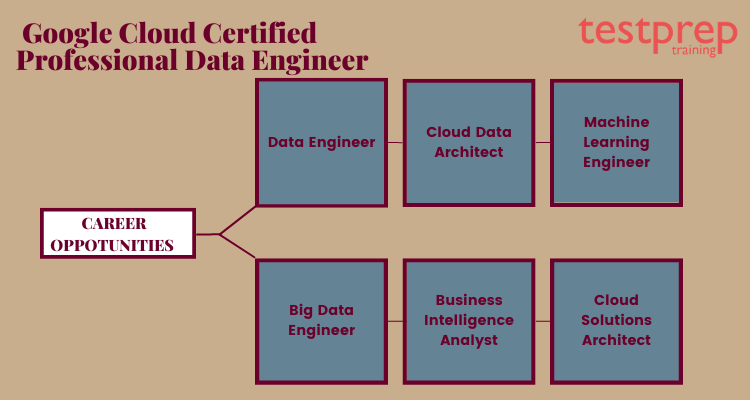The Google Cloud Certified Professional Data Engineer certification is an industry-recognized credential that validates your expertise in designing and building data processing systems, creating machine learning models, and developing data visualizations using Google Cloud Platform (GCP). The certification can open up several career opportunities in data engineering, especially in the cloud-based data processing and analytics space. Let’s explore some of the career opportunities that you can pursue after obtaining the certification.
Rising Demand and Importance of Data Engineers
In the era of big data and cloud computing, data engineering plays a critical role in managing and leveraging large volumes of data effectively. Some of the key reasons for a rising demand data engineers –
- Helps in Data Collection and Integration: We are witnessing enormous big data containing structured and unstructured data from various sources. The job role of Data engineer involves collecting, extracting, transforming, and integrating this diverse data into a unified format for analysis and processing. Thereby ensuring data consistency and quality, enabling organizations to make informed decisions based on reliable and complete data sets.
- Boosts Scalability and Performance: In the era of cloud computing we are witnessing virtually unlimited storage and computing resources. Data engineers help in leveraging cloud-based technologies and platforms to design and implement scalable data processing and storage architectures. Thereby, assisting organizations to handle large data volumes, perform complex analytics, and support growing business needs without compromising performance and maintaining infrastructure costs.
- Facilitates Data Warehousing and Management: Data engineers help in designing and implementing data warehouses `and data lakes that serve as centralized repositories for structured and unstructured data. Data engineers also also responsible to ensure data governance, security, and compliance by implementing access controls, data protection mechanisms, and regulatory requirements.
- Ensures smooth Data Transformation: Data engineers assist in applying data transformation techniques such as data cleansing, aggregation, and enrichment. These processes help in generating accurate insights, creating meaningful data models, and facilitating data-driven decision-making.
- Assists in Data Pipeline and Workflow Management: Data engineers look after the development and management of data pipelines and workflows. This involves orchestrating the flow of data across various stages, integrating data processing and transformation tasks, and automating the data pipeline. Data engineers thereby ensure smooth and efficient data movement, enabling real-time or near-real-time analytics and timely delivery of insights.
- Implement Advanced Analytics and Machine Learning: Data engineers also supports the deployment of machine learning models into production environments, enabling real-time decision-making and automation.
- Facilitate Data Governance and Compliance: In the era of strict data privacy regulations, data engineers plays a crucial role in implementing data governance and compliance frameworks. To ensure data protection, privacy, and compliance with regulations, data engineers establishes data lineage, monitors data access and usage, and implements mechanisms to address data privacy concerns and prevent data breaches.
Job opportunities – Google Cloud Certified Professional Data Engineer
The Google Cloud Certified Professional Data Engineer certification is a highly sought-after credential in the field of data engineering. Some of the in demand jobs are –

Data Engineer
A certified data engineer can work as a specialist in data engineering, focusing on designing, building, and managing data processing systems. As a data engineer, you can be responsible for building efficient and scalable data pipelines, ensuring data quality and integrity, and integrating data from various sources. You can work in various industries, including finance, healthcare, retail, and technology.
As a data engineer, the average salary in the United States is around $95,000 per year, according to Payscale. However, the salary can vary depending on location, years of experience, and the specific industry you are working in. The growth opportunities for a data engineer are promising, as more and more organizations are moving their data processing and analytics to the cloud.
Cloud Data Architect
As a cloud data architect, you can be responsible for designing and implementing large-scale data architectures and data processing systems on cloud platforms. You can work with data engineers and data scientists to create scalable data solutions that meet the needs of the business. You can also ensure that the data architecture is optimized for performance, security, and cost-effectiveness.
The average salary for a cloud data architect in the United States is around $136,000 per year, according to Payscale. The salary can vary depending on location, years of experience, and the specific industry you are working in. The growth opportunities for a cloud data architect are promising as more organizations are adopting cloud technologies for their data solutions.
Machine Learning Engineer
As a machine learning engineer, you can design and develop machine learning models using GCP’s machine learning services. You can work with data scientists to create models that can be used to make predictions and recommendations based on large datasets. You can also be responsible for deploying and managing the machine learning models in production.
The average salary for a machine learning engineer in the United States is around $112,000 per year, according to Payscale. The salary can vary depending on location, years of experience, and the specific industry you are working in. The growth opportunities for a machine learning engineer are promising as more organizations are looking to use machine learning models to make data-driven decisions.
Big Data Engineer
A big data engineer can work on processing large amounts of data using distributed computing technologies such as Hadoop and Spark. You can build data processing pipelines using GCP’s data processing services like Dataflow and Dataproc, and use BigQuery to store and analyze the data. You can also be responsible for optimizing the data processing pipeline for performance and cost-effectiveness.
The average salary for a big data engineer in the United States is around $120,000 per year, according to Payscale. The salary can vary depending on location, years of experience, and the specific industry you are working in. The growth opportunities for a big data engineer are promising as more organizations are looking to process and analyze large amounts of data using distributed computing technologies.
Business Intelligence Analyst
As a business intelligence analyst, you can work on creating data visualizations and reports to help organizations make data-driven decisions. You can use GCP’s data visualization tools like Data Studio to create interactive dashboards that can be shared with stakeholders. You can also be responsible for ensuring the accuracy and integrity of the data used in the reports and dashboards.
The average salary for a business intelligence analyst in the United States is around $75,000 per year, according to Payscale. The salary can vary depending on location, years of experience, and the specific industry you are working in. The growth opportunities for a business intelligence analyst are promising as more organizations are looking to make data-driven decisions using data visualizations and reports.
Cloud Solutions Architect
As a cloud solutions architect, you can design and implement cloud-based solutions for organizations that want to migrate their data and applications to the cloud. You can work with different teams to ensure that the solutions meet the needs of the business and comply with industry standards and regulations. You can also be responsible for optimizing the solutions for performance, security, and cost-effectiveness.
The average salary for a cloud solutions architect in the United States is around $132,000 per year, according to Payscale. The salary can vary depending on location, years of experience, and the specific industry you are working in. The growth opportunities for a cloud solutions architect are promising as more organizations are looking to migrate their data and applications to the cloud.
Let’s now discover the salary and growth opportunities offered by these roles.
Let’s now move on to the preparation part.
Tips for Google Cloud Certified Professional Data Engineer
- Review the exam guide: Start by reviewing the exam guide provided by Google. This guide will give you an overview of the exam format, topics covered, and the skills you need to pass the exam.
- Understand the concepts: Make sure you thoroughly understand the concepts and technologies covered in the exam. Focus on areas where you may be weaker, and use Google’s documentation to review these areas.
- Practice with hands-on exercises: To reinforce your knowledge and prepare for the exam, practice with hands-on exercises. Google offers a variety of free resources and labs that can help you gain practical experience with their cloud services.
- Join a study group: Joining a study group can be helpful as you prepare for the exam. You can collaborate with other professionals and learn from their experiences. You can also join online communities like the Google Cloud Certified community or forums to ask questions and get help.
- Use practice exams: Google offers practice exams that can help you familiarize yourself with the exam format and question types. These practice exams can also help you identify areas you need to improve.
- Manage your time: The exam is timed, so you must manage your time effectively. Make sure you understand the types of questions you’ll encounter, and allocate your time accordingly.
- Stay up to date: Finally, stay up to date with the latest developments in the field. Follow industry blogs, attend webinars, and keep an eye on new technologies and trends in the industry.
Final Words
In conclusion, obtaining the Google Cloud Certified Professional Data Engineer certification can open up various career opportunities in the field of cloud data engineering. Some possible roles that can be pursued after obtaining this certification include data engineer, cloud data architect, machine learning engineer, big data engineer, business intelligence analyst, and cloud solutions architect. These roles offer promising salary and growth opportunities, with the demand for cloud data engineering professionals increasing across industries.
To pass the exam, individuals should focus on understanding the concepts covered in the exam, practice hands-on exercises, join a study group, use practice exams, manage their time effectively, and stay updated with the latest industry developments.


